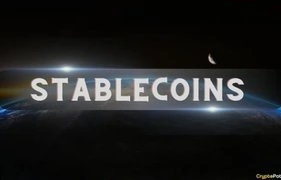In 2023, digital assets experienced an exceptional year, witnessing a remarkable surge in Bitcoin prices by over 172%, with a correction of less than 20%. In addition to Bitcoin and Ether, capital inflows in stablecoins also remained positive.
The market surpassed crucial technical and on-chain pricing models, and October emerged as a pivotal moment for institutional capital movement, according to Glassnode’s recent analysis.
Stablecoins in 2023
Over the last two years, the market capitalization of global stablecoins has exceeded $100 billion, and USDT’s market cap alone has accounted for over $90 billion. The growth is primarily propelled by their use in applications related to decentralized finance (DeFi), trading, and liquidity management.
Despite being mired in controversy, Glassnode observed a notable shift from the previous cycle in terms of the role played by stablecoins in market dynamics. They have emerged as the “preferred quote currency” for traders and a primary source of market liquidity.
The aggregate supply of stablecoins has been decreasing since March 2022, declining by 26% from its peak due to regulatory pressures with the US Securities and Exchange Commission (SEC) charging BUSD as a security, capital rotation (favoring US treasuries over non-interest bearing stablecoins), as well as diminishing investor interest during the bear market.
However, October has marked a turning point, with total stablecoin supplies hitting a low at $120 billion and starting to grow at a monthly rate of up to 3%. This marks the first expansion in stablecoin supply since March 2022 and indicates a likely resurgence of investor interest.
“The relative dominance between various stablecoins has also undergone significant shifts between 2022 and 2023. Previously rising stablecoins like USDC and BUSD have seen their dominance shrink significantly, with BUSD entering redemption-only mode, and USDC dominance falling from 37.8% to 19.6% since June 2022.”
Stablecoin Lobbying Efforts
Stablecoins serve as a bridge between the crypto and traditional financial systems. Despite the aforementioned controversy, this cohort of digital assets has garnered attention from not only the Biden administration but also bipartisan congressional lawmakers.
Tether, the issuer of the largest stablecoin commanding a 72.7% market share, reportedly allocated $760,000 for lobbying in the first three quarters of 2023, doubling the expenditure from the previous year.
Circle Internet Financial, the fintech company and issuer of USDC, also increased its lobbying spending to $300,000 during the same timeframe.
Additionally, crypto exchange Coinbase invested $2 million in lobbying activities covering various crypto-related issues, with a notable focus on stablecoins. Traditional financial entities like Bank of America and Visa, along with the US Chamber of Commerce, have similarly contributed to lobbying efforts.
— Reports /TrainViral/
























